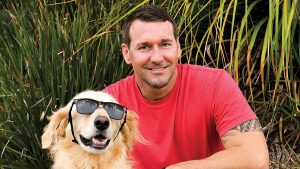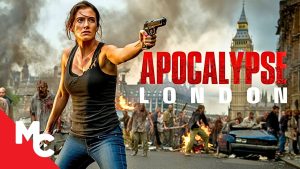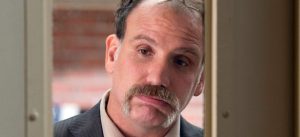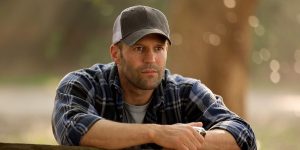
Earlier this year, when he told his colleagues that he would be leaving NBC News, former Meet the Press moderator Chuck Todd said that he had an entrepreneurial itch that he needed to scratch.
“The only way to fix this information ecosystem is to stop whining about the various ways the social media companies are manipulating things and instead roll up our collective sleeves and start with local,” he wrote.
Those plans are continuing full-bore, with Todd seeking to raise money and having having honed in on a starting point: Local youth sports. At the same time, he has relaunched his Chuck Toddcast, which he launched with NBC, but is now bringing to YouTube, Spotify and the other places people consume their news and information today.
The veteran political journalist has never been shy about voicing his thoughts on matters he deemed important, but he says that being freed from the limitations of a network news division carries its own costs and benefits. The Hollywood Reporter spoke with Todd about relaunching his podcast, how national political news has evolved and his vision for the future of local news.
Chuck, you’ve had a few shows under your belt now, and I know you’ve been planning this for a few months since you left NBC. Now that you’re up and running, it seems like you’ve got a cadence going with the show, no?

I’m still trying to figure out that cadence. My plan was to do two or three podcasts a week, I’ve already done four each week. I’ve been both reassured and overwhelmed by the response. Like here, I thought I was going to struggle booking, and now I’ve got too much, and I’m trying to space it out, so that’s been interesting. But I’m trying to find the cadence of figuring out how often do you need to be on the news versus not.
I literally did back-to-back YouTube shows on Wednesday where the entire topic was about the tariffs calamity, and then I get done with it, and 10 minutes later, Trump reverses a little bit, but in the moment, it felt like a big deal and it made all of that stuff — now, wasn’t my content, it was somebody else’s content — but made it completely obsolete, right? And you’re just like, okay, this is the other danger of not being live.
But I’m still learning the cadence, I’ll just be frank with you. I’m still trying to figure out, is Fridays better than Mondays? Is Mondays better than Sundays? Learning that sort of thing. But I’m certainly enjoying not asking permission. That’s probably the most liberating feeling. I didn’t have to ask permission to talk with you. NBC always worried about “what’s he gonna say?” That is probably the most liberating feeling, and it’s still a habit. Should I say it this way? It’s just about me now, what am I worried about?
When you announced your exit, you suggested that you wanted that freedom to really say what you wanted to say, and to cover the stories you wanted to cover. How long had you been thinking about this? When I look around and I talk to talent leaving traditional television to go to YouTube and podcasts and all these other platforms, I hear that a lot.
There’s a lot of people that that are getting a little tired of the handcuffs, so to speak, of the traditional networks — as great a job as they are — and are kind of seeing that. So how long have you been thinking about this and how did you hone in on what you wanted to do in this environment?

I’ve been trying to figure out what I was going to do next for a while now, this is even before I left Meet the Press in that I knew I was closer to the end than closer to the middle, if that makes sense. This was sort of right after the ’22 midterms. The ambition I had at that time was to run a news organization. I sort of felt like, “Okay, I know how to make content, but I think this is a poorly run business right now,” and when I say this, this was not specific to my news organization. I mean generally, I think there’s a lot of weak leadership right now in the traditional media space, and part of it is because the parent companies are running for cover. It looks like a failing business. It’s time to concentrate on other businesses.
So what was clear to me is that I wanted more say in how we do this, and not just in what I do, but how we do it. Frankly, there was a small point in time I thought well maybe I can convince somebody at Comcast to let me run things, I have a vision here of what we could do and how we could do it. And then you quickly realize they weren’t interested in fixing the news business. When you’re at a big, multi-national company, you may think, well, “I need to fix this. I need to come up with a better business model for TV advertising, for news, than what we have.” Like, I think of the underwriters space, or the events space, is something that I thought was necessary, whether it’s Meet the Press, the Today show things like that, and you come quickly to realize, it’s a drop in the bucket.
I still think about [former General Electric CEO] Jeff Immelt’s comment one time, back when GE owned NBC. He’d say, “NBC is 95 percent of my headaches and 5 percent of my bottom line.” And then I remember when Brian Roberts was quoted — I never heard him say it, but I read it — supposedly his ratio was 90-10. They don’t see it as an opportunity, they see it as a problem. And even if you say, “hey, I think I have a business solution to this problem,” it wasn’t a business problem, it was a cultural problem, right? That, to me, is unfixable. Whether you’re at Disney, Warner Bros., Comcast, you name it. They’re moving into another space, and they don’t have time to incubate this. And I respect that, they have a fiduciary responsibility to their investors, their shareholders, not necessarily the general public. And you quickly realize it is what’s in the best interest of fixing the news ecosystem and what’s in the best interest of some of these companies, that is divergent.
So look, I’ve been trying to figure out where can I go to sort of get into this space of trying to build a better ecosystem, whether it’s rebuilding it or building it from scratch. So for the last year and a half, I’ve been looking at different avenues.
I’ve always looked at Gannett and USA Today as one of the great failures of the internet, because they were there. They could have dominated the internet and the digital age and become the sort of backbone of news and information. And they chose not to. They doubled down on their newspaper business, and this happened to so many media companies. You’re you’re afraid of cutting into revenue that is there in the moment, even though you know it’s going to be revenue that’s not going to survive, versus investing in the future. So I still look at Gannett as an interesting idea. Could it be fixed? And then you realize there’s too much debt, and they don’t want to give it up, all they’re doing is extracting cash.

I sort of view what I’m doing in two parts. One is, I still think I have something to offer in the political analysis space. What I do, I’ve always viewed it as political anthropology. I’m a political anthropologist trying to explain why people are behaving the way they are, why they’re building the way they are. I’ve always thought that’s probably what I do best. And in some ways, the podcast space, this space, is a better place to do it than anywhere on television. And frankly, I just enjoy podcast interviews much more than the traditional media interviews.
You know, a lot of people do.
You get more context. I think the five to 10 minute interview is part of the problem in political communication. It’s a game, right? Can you run out the clock If you’re the interviewee? Can you get your gotcha viral moment if you’re the interviewer? It doesn’t serve the purpose of surfacing information that people need. There’s a goody two shoes part of me that likes this space. But the other part of this is that I really think there’s a huge opportunity here to rebuild the ecosystem from the ground up. I’ve concluded that our trust issue, I think, is because of the evisceration of local news. We’re not going to fix this without starting there. So ultimately, I’ve concluded that we’re better off trying to build this infrastructure from scratch, where I believe, frankly, that there’s a good business, and actually it might be healthy for the ecosystem.
There’s two pieces that I want to dig in to there. There has been reporting that you’re looking for money to maybe do an acquisition. You mentioned already that you’re interested in the local space. What is the type of business that you think you can turn around? I know you mentioned Gannett, is that the sort of thing that like you are looking for? Or is it really more opportunistic, smaller, building something from the ground up?
I think it’s smaller, but it’s something that’s a little more 21st century. And I’ll just leave it at that. I kind of want to be careful here, but my thesis is I think that youth sports and high school sports are community glue, and I think there is a way to use that community glue to create a revenue stream that can pay for the journalism.

Ultimately, the problem to solve in local journalism is replacing classified ad revenue. I often joke: A guy named Craig thought classifieds ought to be free, yada, yada, yada, Donald Trump became president. The loss of that revenue, particularly for news organizations with a circulation of 50,000 or less, was just catastrophic. And it also was an incredibly elegant business model. The revenue over here pays for the journalism over there, which is also a reminder, nobody’s ever paid for news. They weren’t paying for news. They were paying for a guide to their lives. I think we journalists need to realize that the people that pay for news are not the audience. We are producing way too much journalism for journalists and not enough journalism for everybody else. And local is a perfect example of this. So look, I have this thesis that youth sports and high school sports is only going to grow, and I mean exponentially, that what we’re seeing with college, and NIL, the pathway to pay for college via playing a sport. This isn’t a 1 percent anymore. This is in the one of five kids are probably going to find some sport. Is it volleyball? Is it lacrosse? Is it gymnastics? Is it basketball? Is it baseball? Is it softball? The fact of the matter is now our aperture is widened when it comes to the youth sports world.
I just learned this today, actually, with a potential partner I was interviewing, that there are more youth cricket clubs in New York City than baseball clubs for little league. We’re seeing a diversity of expansion of sports, and we’re seeing sort of micro-revenue possibilities all over the place. Red and blue America all want to see their kids play sports. So I sort of see it as an asset in trying to build trust in a community. This is not about starting 50 new news organizations. This is about starting 1,000, creating a Five Guys, a McDonald’s sort of like blueprint.
I do think what a national arm or spine can do for these local outlets is provide them some of the stuff they can’t afford, or that could put them out of business. But there’s also trying to build a locally sourced ad network, and then, oh, by the way, you might end up with more. I got my start covering politics at the [National Journal] Hotline, which wouldn’t have existed without local political journalism. If you tried recreate the Hotline today, you couldn’t, you’d have to go to Substack.
Back in the day, what made us interesting is we were able to use local journalism and then create a larger national story. I joke, you know, the best restaurants in my town are the ones that claim they have locally sourced ingredients. Well, I’ll tell you what, I want my political news locally sourced. I’m tired of it being Washington based or blogger based. But how do you fund it? How do you get there? I think youth sports is the answer to funding it. That’s how I’m trying to go down the road, because I also think you’re looking for investors. I think that the vision of making money in the youth sports space is a lot more realistic than telling them they’re going to make money in local news, when we already know the local news space is a tough space. But if you can figure out a way to marry those two issues, those two things, then maybe you could do both a good public service and at the same time build a good business.
If I recall you were at Sports Business Daily.

I was one of the founders. Yeah, we helped start it and and, in fact, somebody I was just talking to today I got connected to because the first hire we made is Abe Madkour, who still runs the place.
To return to the Chuck Toddcast, one of the things that I’m seeing is, in some ways, it’s kind of becoming the new television news for people under 50.
I was shocked, this the first time I’ve ever done a YouTube channel. I had not had a YouTube channel back at the NBC days or when I had the Toddcast when it was under the NBC umbrella. And one of the big changes for me, and frankly, I’m a little out of my comfort zone, thinking about this as a YouTube show as well. I’ve had multiple friends of mine go, “oh, now I’m gonna listen to your podcast because you’re on YouTube, I have to see a podcast.” I had no idea. And you’re 100 percent right. This was something I was blind to, that I’m obviously no longer blind to.
I was going to say, there is now a constellation of talent, both people who are starting on YouTube, and also people like yourself who used to work in cable news or broadcast news and have kind of moved over So there is this kind of back and forth where everyone goes on each other’s shows. How have you adapted to that, and how are you trying to plug into this larger ecosystem that’s out there?
I was on Piers Morgan’s show earlier this week. I’m well aware who’s got a lot of eyeballs. Look, I do think we’re in a moment. If you actually look at the history of media, we go through cycles of fragmentation and consolidation. When we figured out how to reproduce photographs easily, magazines exploded all over the place. In the early part of the 20th century, there was millions of radio stations, until it got consolidated down. Everybody was a newspaper publisher until that got consolidated. I think we are in one of those explosive periods where we’re fragmenting.

But you can picture where consolidation is going to go, right? It’s pretty obvious to me that Substack is going to break up into 50 different Bari Weiss projects. Bari Weiss is, to me, showing people how you can take the Substack model and put this together. I know of some new startups that are trying it as apps, that are intriguing to me too. But you see where this is going, where everybody’s an independent journalist, but they’re under the same umbrella. I think it’s inevitable. Megyn Kelly is moving in this direction. Frankly, I’ve already had some inquiries from some newer podcasts who are looking for some network umbrella. And what I’m assuming is about to happen, and I hope to be part of both aspects of it, is help to consolidate an expert class of podcasts, explanatory podcasts, but also figure out which networks are worth being a part of. And I think this is going to be the future, where everybody’s maybe a part of three or four networks.
I can’t tell you exactly how it looks like, but don’t you see it? It’s inevitable that some consolidation is coming, and there are going to be some good efforts and some failed efforts. And that’s probably what the next five years looks like.
I’ll tell you another big moment that’s coming, Alex, is the NFL may announce that they’re going to opt out of their media deals in 2029. I think this is going to break one or more of the traditional networks. I expect Comcast to pony up whatever it takes to keep Sunday Night Football, and they have the resources to do it, and they have a rationale to do it. I expect Disney to pony up whatever it takes to match, Fox and CBS are in a different place. Can they keep up with the joneses? My guess is one of them will partner with YouTube and say, “hey, can we just sublicense from you? You get the media rights.” One may partner with Amazon. You can feel that’s coming.
We started Sports Business Daily in 1994, that was the first break of the affiliate system. CBS lost all its affiliates because Fox came into the business, and it became this massive realignment in the television space. This could be the thing that breaks the affiliate networks all over the country. And then that is the moment where you could see both an explosion of YouTube and at the same time, a new consolidation. And I’m not sure what it looks like. I feel like by the end of this decade, you’re going to see a massive change in the traditional system of networks and affiliates that’s going to scramble everything. Scrambles the local media markets, scrambles local news. And this is, frankly, the moment I’m trying to prepare for, I want to be a part of this. I think there’s a big bang that’s about to happen in that space. And I also think those that are prepared, that are platform neutral, have a real opportunity. And to me, this is the moment that that you’ve got to prepare for.
I think every executive at the NFL will tell you that they gladly take credit for the current state of broadcast television, they feel like they helped build Fox to what it is. And I think you’re right, I think it’s going to crack, assuming the NFL does make that decision.

It’s going to crack it. And this is going to have so many after-effects. Now, look, we assume the NFL does it, but we don’t know. Tariffs could cause such an economic downturn that suddenly the NFL realizes, maybe we can’t get more money, we’ll stay in our contracts, there is a scenario where this doesn’t happen, but it means the global economy craters, but if there is some stability at some point in the global economy between now and 2028, I think this is a moment of reckoning for the rest of network and affiliate system.
When you look at the talent that have made the jump from traditional media to YouTube, there’s a wide spectrum of you know, “Voice of God” anchors on one side to pure pundits on the other side, there’s a pretty wide spectrum. It does seem to me that a lot of the voices that have had the most success so far…
Have been on the pundit side, yeah.
As someone who I think, skews more on the news-driven side of things, what do you think is the opportunity there? And how do you convince an audience that I think is maybe growing a little more accustomed to strong opinions, to give news a shot?
I guess I’m just stubbornly believing there’s always going to be a market for this. I’ve learned that there’s two different ways to grow. If you slowly grow within the analytical space — and that’s sort of what I would like to believe I’m in — there’s others in it, Nate Silver’s in this space arguably, my friend Chris Cillizza is in it. The quote, expert class, analytical class, however you want to call it. I think there’s always room for them. And the question is can you become a creator that is an “and” product, not an “or” product, so that there’ll be people that want to hear from a progressive and want a reality check from the analytical side, those that want to hear from a conservative, say, Megyn Kelly, but would like to get a second check. I’m just betting on it, I have somebody in my life who constantly says, you could easily pick a side and probably grow faster, make more money quicker. But I wouldn’t feel good. I’m not comfortable in that space. I never have been. The tension that I felt trying to do what I was doing at MSNBC with Meet the Press, and at the same time feeling the audience pushback. It’s a lot easier to cater to an audience than it is to tell them something that they may not want to hear, but that is reality based.

At least in this space, I don’t have micromanagers and corporate leaders who are worried about perception versus reality. That’s another thing we go through cycles in, we had a super partisan press in the 19th century. The muckrakers come along, and we create this sort of more dispassionate press culture for arguably the last half of the 20th century. We’re back to a partisan press, but you can feel the exhaustion of a partisan press. So this is why I think the only way to sort of rebuild a more trusting media is probably to start bottom up. I grew up in a household that subscribed to New Republic and National Review because my father was a conservative, but he wanted to hear liberal arguments. I think that’ll come back again, and you just have to bet on it. And I’m betting on it.
Let’s hope we can have a healthy environment.
But that’s the thing. Just when you think oh, it’s never going to change, this business changes. There’s a reason when you describe it as a hockey stick moment, right? It doesn’t move, it doesn’t move, it doesn’t move, and then suddenly it moves. So I think there’s an exhaustion from this type of politics. We realize it’s not healthy, and now that people realize it’s hurting their bottom line, it really could sober up what I call the larger center of America. The 30 yard line to the 30 yard line center, not necessarily the 45 yard line, but people that are, “I lean left, but I’m not a partisan hack.” “I lean right, but I’m not a partisan hack.” “I’m an American first.” I’d like to think that’s still going to come back.
#Chuck #Todd #Chuck #Toddcast #Local #Sports #Venture







